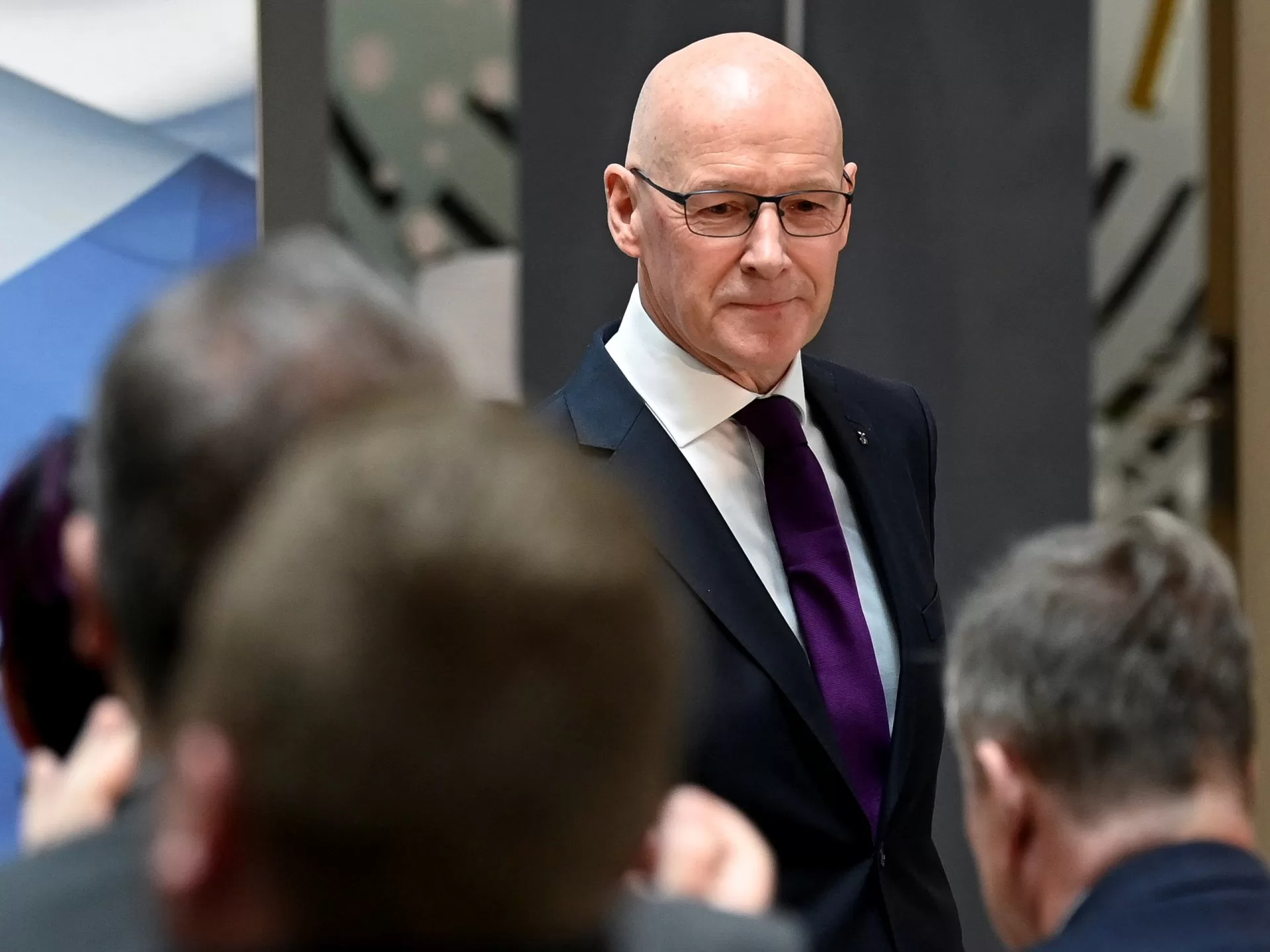Mild-mannered, 60-year-old Swinney, who joined the SNP at 15, is the party’s third leader in 14 months.
The new leader of the Scottish National Party (SNP), who was officially sworn in as Scotland’s seventh first minister on Wednesday, has made a career out of being a steady political presence at the heart of an SNP government, which has been in power for 17 years.
The veteran politician, who served as Scottish finance secretary and deputy first minister in previous SNP administrations, and who was SNP leader between 2000 and 2004 during the party’s years in opposition at the devolved Scottish Parliament, described his ascendancy to Scotland’s highest office as “something of a surprise”.
Lawmakers confirmed his appointment on Tuesday following Humza Yousaf‘s resignation last month.
“When I stood down as deputy first minister in March last year, I believed that would be the last senior office I would hold in politics,” Swinney told the Scottish Parliament following his confirmation. “Having served then as a senior minister for 16 years, I felt I had – to coin a phrase – done my bit.”
But senior SNP figures turned to 60-year-old Swinney when Yousaf, 39, was forced to quit after collapsing the SNP’s power-sharing agreement with the Scottish Green Party in April.
‘He hasn’t changed much in 20 years’
The SNP, which made international headlines 10 years ago after it almost achieved Scottish independence from the British state in a sovereignty referendum in 2014, has become a beleaguered force of late.
Scandal, including the 2020 trial and acquittal of one-time SNP First Minister Alex Salmond on sexual assault charges, and last month’s decision by Scottish police to charge Peter Murrell, the husband of the former First Minister Nicola Sturgeon, with the embezzlement of funds from the SNP, has gone hand in glove with the party’s falling poll ratings.
As a resurgent Labour Party in London threatens to end the SNP’s dominance at both a UK Westminster and Scottish Parliament level, is Swinney the man to reverse his party’s flagging fortunes?
“Those who were sympathetic to Swinney during his first spell as leader felt that he was a good organiser behind the scenes, but accepted that he failed because the public didn’t warm to him or have confidence in him,” said James Kelly, who runs the pro-independence Scot Goes Pop blog. “The problem is that he hasn’t changed much in 20 years. His communication skills are still workmanlike and aren’t in the same league as Salmond and Sturgeon.”
Kelly conceded that “not all popular leaders are conventionally charismatic”, adding: “The fact that he’s older and that the public have seen his competence in government over many years will make him more popular the second time around.”
Swinney appointed the 34-year-old socially conservative Kate Forbes, widely seen as a future party leader, as deputy first minister.
The new first minister has pledged to make tackling child poverty a priority of his premiership.
He joined the party at 15 and has been a sitting member of the Scottish Parliament (MSP) since it was established 25 years ago.
But his four-year stint as leader was seen as unsuccessful after he presided over the SNP’s poor showing at the 2003 Scottish Parliament election. After the pro-independence party claimed victory over Scottish Labour in 2007 under the leadership of Salmond, Swinney was appointed cabinet secretary for finance.
Despite his bookish reputation, Swinney once admitted that he had contributed to the divisive nature of the Scottish Parliament by “heckling from a sedentary position”.
As Scottish first minister, he will have to juggle the responsibilities of being a reassuring presence to his wife, Elizabeth, who has multiple sclerosis, and handling the day-to-day demands of running a minority government in a legislature where the SNP’s opponents are itching to end the party’s dominance at the next Scottish Parliament election in 2026.
Some SNP voters say they have faith that Swinney will weather political storms – and steer the party into calmer waters.
“Swinney will make an excellent first minister for the people of Scotland,” said SNP supporter Angela Curley, a university lecturer who believes his “calm manner and experience” would reunite the party which is now onto its third leader in just 14 months.
The SNP’s ultimate goal is an independent Scotland, which polls say is supported by about 50 percent of Scots.
“I think the debate is still there. Polls suggest that the independence debate has not lost momentum, which could indicate it is now above party politics or manifesto mantra,” said Curley. “I think Swinney simply needs to be the constant gardener, ensuring the right people are in the right posts to maintain public confidence.”
